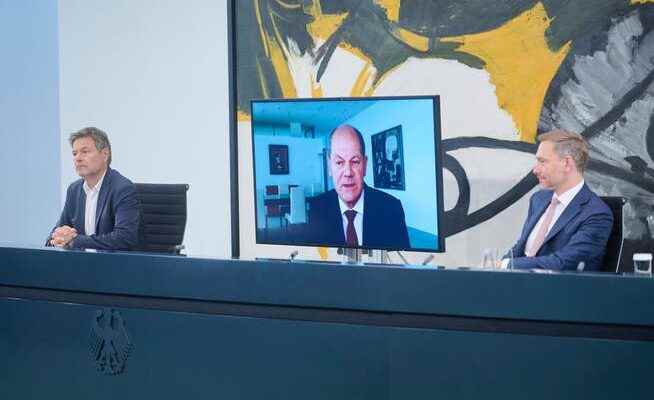Germany has to reduce gas consumption if it wants to get through the winter without shortages. Chancellor Scholz is sending the wrong signal with his double-boom rhetoric.
Economics Minister Robert Habeck (Greens, left), Chancellor Olaf Scholz (SPD, switched on because of a corona infection) and Finance Minister Christian Lindner (FDP) announce the “double boom”.
«The prices have to come down. . . The federal government will do everything for this.” With these words, the German Chancellor Olaf Scholz described one of the main goals of the “economic defense shield against the consequences of the Russian war of aggression” announced on Thursday, which would cost up to 200 billion euros. That was not a happy choice of words in two respects.
Price shows scarcity
First, a government can do little to bring about a real reduction in the high (world) market prices for energy. These are an expression of an acute shortage, triggered by the drying up of supplies from Russia. The state could do more to expand energy supply to curb prices, but that’s not what the package is about.
A drop in demand would also have a dampening effect. But with the promise of falling prices, Social Democrat Scholz – secondly – does not create any incentives to save. Instead, he threatens to lull consumers into the illusion that things won’t be as bad as they used to be. This is all the more dangerous as the high prices due to long-term contracts have not yet really reached households and their Gas consumption is currently even increasing. Germany would have to curb consumption to avoid shortages in winter.
receive savings incentives
Therefore, the still outstanding specific design of the planned gas and electricity price brakes is of central importance. In essence, they are an anti-market, artificial lowering of retail prices through temporary subsidies. There may be reasons for this, because the foreseeable massive price increases threaten to overwhelm many households and companies. However, the brakes must at least be designed in such a way that they do not completely eliminate the price signals and, as far as possible, retain incentives to save.
Indeed wants the traffic light government only subsidize “basic consumption” and leave market prices as they are. The Green Economics Minister Robert Habeck spoke a little more plainly than Scholz: The “top 20 percent of normal consumption . . . certainly have to pay the full bill,” he said on Friday in “Deutschlandfunk”.
But the devil is in the details. A group of experts is to present recommendations on the gas price brake shortly. The group also includes renowned economists, including Veronika Grimm, the co-chair. It is to be hoped that their economic expertise will prevail against the particular interests of various lobbies – and that the “traffic light” will then also adhere to the recommendations.
Hü and Hott
Because so far, the genesis of the defensive screen, which Scholz hailed as a “double boom”, does not testify to high governance. So the umbrella only came about at the last minute. With the gas price brake and direct state aid for distressed gas importers, it replaces the previously planned gas levy, which all gas consumers should have paid – and which was better than its reputation. Were it not for the implementation of Thursday’s announcements on Friday been abolished by hasty ordinance, it would have come into force on Saturday night. How should companies calculate with such a hoo and bang?
The short term is due to the fact that the three traffic light parties have been arguing about the financing for a long time. The compromise that has now been reached is ugly: the liberal Finance Minister Christian Lindner can emphasize that the debt brake will be adhered to again on paper in 2023 and that the funds for the defense shield are earmarked. But once again the “traffic light” hides enormous expenses in a secondary budget. Even if the instrument is called “special assets” in Orwellian fashion: it is about debts for which the taxpayer has to pay interest and repayment – and which also have an inflationary effect because they create additional demand.
You can contact the Berlin business correspondent René Höltschi Twitter follow.
